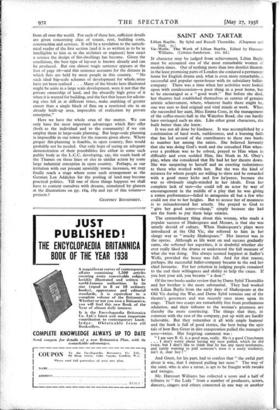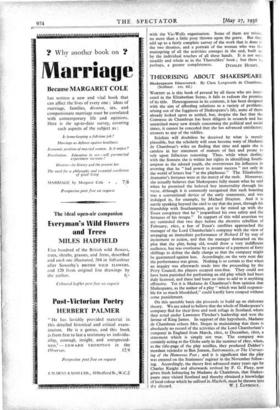SAINT AND TARTAR
Vic-Wells. The Work of Lilian Baylis. Edited by Harcourt Williams. (Cobden-Sanderson. ins. 6d.)
IF character may be judged from achievement, Lilian Baylis must be accounted one of the most remarkable women of modern times. Out of nothing more than two derelict theatres in theleast promising parts of London she conjured a permanent home" for English drama and, what is even more remarkable, 'a successful and popular opera-house with its subsidiary ballet- company. There was a time when her activities were looked upon with condescension—a poor thing in a poor home, but to be encouraged • as .a "good work." But before she died, her theatres had established themselves as centres of genuine artistic achievement, where, whatever faults there might be, one was sure to find original and vital minds at work. When she succeeded her aunt, Miss Emma Cons, in the management of the coffee-music-hall in the Waterloo Road, she can hardly have envisaged such an aim. Like other great characters, she built better than she knew.
It was not all done by kindness. It was accomplished by a combination of hard work, ruthlessness, and a burning faith that has led several of the contributors to these two books to number her among the saints. She believed fervently that she was doing God's work and she consulted Him when- ever a problem was to be solved, prayed to Him when in difficulty and even scolded Him, like Noah in M. Obey's play, when she considered that He had let her theatre down. She was unsparing to herself and an exacting taskmistress to those who worked with her. But she was the kind of mistress for whom people are willing to slave and be rewarded with a good many kicks and few ha'pence, because she was so obviously single-minded in her ideals. Even her complete lack of tact—she could tell an actor by way of -encouragement in the middle of a play that he was giving a rotten performance—failed to antagonise all but a few who could not rise to her heights. But to accuse. her of meanness is to misunderstand her utterly. She prayed to God to "give her good actors—cheap," simply because she had not the funds to pay them large salaries.
The extxaordinaty thing about this woman, who made a popular success of Shakespeare and Mozart, is thai she was utterly devoid of culture. When Shakespeare's plays were introduced at the Old Vic, she referred to him in her slangy way as "mucky Shakespeare." Her interest was in the operas. Although as life went on and success gradually came, she softened her asperities, it is doubtful whether she ever really liked the drama or understood the full measure of what she was doing. She always seemed happiest at Sadler's Wells, provided the house was full. And for that reason, perhaps, the successful ballet-company became in the end her chief favourite. For her criterion in judging people remained to the end their willingness and ability to help the cause. If you lent your aid, you became "a dear."
Of the two books under review that by Dame Sybil Thonidilce and her brother is the more substantial. They had worked with Lilian Baylis from the early days of Shakespeare at the Old Vic during the War, and Dame Sybil remains one of the theatre's governors and was recently once more upon its stage. Their two essays are remarkably free from posthumous adulation, and their tributes to the woman's greatness are thereby the more convincing. The things that they, in common with the rest of the company, put up with are hardly believable. But they remember it all with • ample humour and the book is full of good stories, the best being the epic tale of how Ben Greet in dire exasperation pulled the manager's nose—twice. Her forgiving comment was :
"I am sure B. G. is a good man, really. He is a good Churchman . . . I don't worry about having my nose pulled, which he did twice, but I don't like to think -that he- has any nasty tendencies, and surely wanting to pull someone's nose is a nasty tendency, isn't it, dear boy ? "
And Greet, for his part, had to confess that "the awful part about it was, that I enjoyed pilling her nose." The way of the saint, who is also a tartar, is apt to be fraught with tweaks and twinges.
Mr. Harcourt Williams has collected a score and a half of tributes to "the Lady" from a number of producers, actors, .dancers,-singers and others connected- in one way or another with the Vic-Wells organisation. Some of them are trivial, no more than a -little posy thrown upon the grave. But they add up to a fairly complete survey of the work that is done in the two theatres, and a portrait of the woman who was the mainspring of all the activities emerges in the end, built up by the individual touches of all these hands. It is not seen steadily and whole as in the Thorndikes' book ; but there is, perhaps, a greater completeness. DYNELEY HUSSEY.



















































 Previous page
Previous page